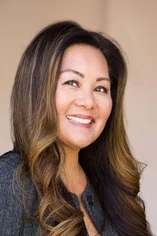Representation matters for students and educators alike
Equity Corner by Tracie Noriega
October 2, 2023

Everyone has an ACSA story. My ACSA story began in 2007. I was a new principal who inherited ACSA duties for my charter. I began to attend Region 6 board meetings and it was there that I met Rose Lock, Belen Magers, Tess Johnson and Karen Sakata. I was in awe of these amazing Asian-American women leaders (I still am!). More importantly, I saw myself in them. Representation matters.
Through the years, especially as the first Filipina-American principal of a predominantly Filipinx student school, I always loved when students would ask if I was Filipino. The pride and excitement were evident when I would say “yes” and they would yell back, “Me, too!” I received a message the other day from a former student’s parent saying that they are now a student teacher because of me. Representation matters.
As of June 2023, there are 17,620 ACSA members. Only 4 percent marked that they are of Asian descent. The data also show that 20 percent are Latinx/o/a, 7 percent are African-American, and 0 percent are Pacific Islanders. Juxtaposed to the students of California who are 9.5 percent Asian, 56 percent Latinx/o/a, 4.7 percent African-American, and less than 1 percent Pacific Islander. It is evident that we have work to do for all of our students to see increased diversity in their school and district administrators. Representation matters.
Ethnic Studies saved my life. I am not the only one.
As the new Senior Director of Diversity, Equity, and Inclusion for ACSA, I am incredibly honored to serve in this role. I fully acknowledge and respect the people who led this work before me: Nicole Anderson, Marguerite Williams and Adonai Mack. I’d like to thank them for the bold and courageous leadership they all modeled for us. Representation matters.
Ethnic Studies saved my life. I am not the only one. This is a sentiment shared by me and so many others. At its core, Ethnic Studies is about the affirmation of identity, love and solidarity. As a second-generation Filipina-American, whose last name was shortened because teachers couldn’t say it, whose parents were told not to teach me in our mother tongue so I wouldn’t have an accent, and who didn’t see herself in the books and the curriculum, Ethnic Studies gave me the vocabulary to explain my lived experience and helped me to heal. Ethnic Studies is my core as an educator, my purpose, and who I represent. Representation matters.
I look forward to serving the students of California through supporting educational administrators across the state. We are all experiencing times that challenge our belief systems. I know together, in community, in solidarity, we will come out on the right side of this, especially as we keep all students at the center.
ADVERTISEMENT



